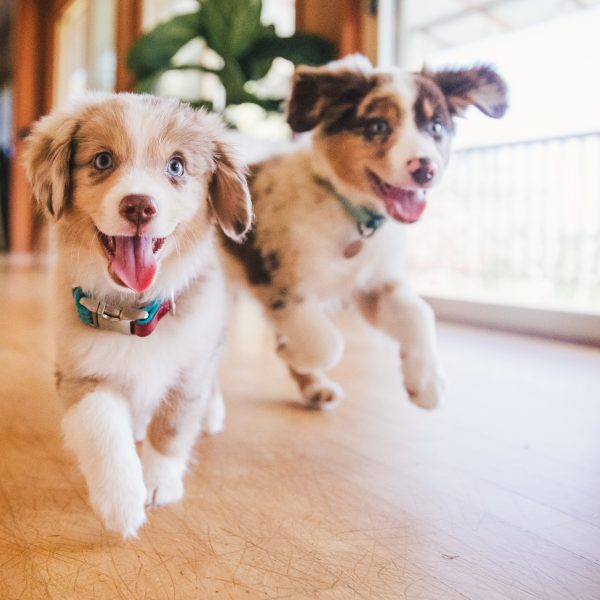6 Signs of a Healthy Puppy

Getting a puppy is an exciting experience! But getting a new puppy can be a little nerve-racking if you don’t know the signs of a healthy dog. For new owners, any new symptom or behavior that you don’t expect can be scary. So what can you expect in a young puppy? Here are a few signs of a healthy puppy:
What is Normal for the Puppy?
If this is your first puppy, it can be hard to know what normal canine behavior is. Taking daily note of your dog’s condition is important in helping you to recognize when something is amiss.
Dogs are creatures of habit so recognizing new or worrisome behavior is helpful in pinpointing how your dog feels. Look for changes in your dog’s habits and behaviors. If you notice something concerning your puppy’s behavior or health, don’t be afraid to talk to your veterinarian.
6 Signs of a Healthy Puppy
Here are things to look for that indicate a puppy’s health:
1. Normal Activity Level
Dogs sleep a lot and so will puppies. Although the average sleep for puppies tends to fall in the 12-14 hour range throughout the day, some puppies may need 18-20 hours of sleep. Your puppy will nap throughout the day, which is normal. but if they nap too much and seem lethargic when awake, this is a sign they might be sick or a sign your dog is in pain.
Puppies should be excited to explore their new surroundings once they settle into your home. They should interact with you, your family members, and any other pets you might have. If they don’t, this could be a sign of something else.
2. Clear Eyes and Clean Ears
A puppy’s eyes should be bright and clear. They should also be free of any discharge. Ear infections are a common health problem in dogs so ears should be clean, with no discharge, odor, or redness. If any of these signs are present, ask your veterinarian.
3. Healthy Appetite
When in a litter with their siblings, puppies will enthusiastically eat. A puppy with a healthy appetite is a sign your dog is happy. However, after bringing a puppy home, it can take a few days until they clear their bowl. If they skip a meal or two, it’s probably fine. However, if they continue to refuse food, or only eat a few bites, it’s time to call the vet.
4. Some Spit Up
A bit of regurgitation in your puppy is normal as their stomachs are growing and adjusting to different food. But if it’s a repeated issue or it happens during dinner time, it can be a sign of a more complicated issue. There could be a few reasons why your dog is vomiting, so it’s important to check it out.
5. Regular Bathroom Trips
Puppies should have regular, firm stools and urine that is clear of blood. One loose stool might not be a sign of something serious, but if it persists, get your puppy checked out. This could be a symptom of an infection, virus, or toxin in your puppy’s system.
Bloody urine can indicate a urinary infection that needs treatment. It’s also one of the symptoms you should never ignore in your dog. Schedule a visit with your vet if you notice this symptom.
6. Good Body Condition and Coat
If you’re able to observe your puppy with their littermates, look to see if they’re all relatively the same size. They shouldn’t be too plump but they also shouldn’t look emaciated either. Your puppy’s coat should also be shiny and clean. Their skin should be clear and free of redness or irritation.
Be Aware of Pano and Parvo
Something new puppy owners need to be aware of is panosteitis (Pano) and Parvo.
Pano
Pano is mostly found in large breed dogs, aged 5 months through 18 months. Pano causes bone inflammation and can last a few days up to a few weeks. If your puppy is limping, it could be pano.
It can be accompanied by fever, loss of appetite, and high white blood cell count. Since these can be signs of other issues, it is wise to see your vet to be sure. It typically resolves itself on its own.
Parvo
Parvo, however, is far more serious. It’s common in puppies ages 6 weeks through 6 months. This very contagious virus attacks the immune system, stomach, and intestines. It can lead to secondary infections if not caught in time.
Symptoms of Parvo include vomiting, lethargy, weakness, bloody diarrhea, weight loss, and dehydration. Being able to recognize these symptoms can save your puppy’s life. Puppies who receive immediate treatment and survive the first few days of parvo usually make a full recovery.
Knowing the signs of a healthy puppy is important to raising a healthy dog. Your puppy will give you love and joy, so giving them a life of love and comfort will go miles in bonding you two for life.
